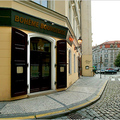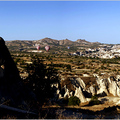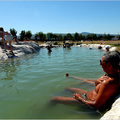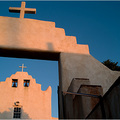OLD-TIMERS always marvel about how much Moscow has changed since the stultifying days of the Soviet Union. That's ancient history. What's really worth marveling about is how much the city has changed in the last year or two. Few places in the world have undergone such a rapid, dizzying and cacophonic transformation as Moscow, and it shows no sign of abating. The gangster Moscow of the 1990s has given way to something tamer, more metropolitan, perhaps, but it is still brash and flashy. The city, like Russia itself, seems to be in search of its identity — embracing the past, though often ironically, while plunging full-speed ahead. What the future holds is uncertain, but meantime, Muscovites are indulging in what an energy-fueled boom has bestowed on them.
FRIDAY
4 p.m.
1) RED SQUARE RISING
A great place to see Moscow's construction revolution is on the edge of Red Square. The city fathers have torn down the old Rossiya Hotel, a giant Brezhnev-era hulk that few will miss, and commissioned a new hotel and entertainment complex by the British architect Norman Foster. The Rossiya's demise has opened the airspace around one of Moscow's most historic places, Varvarka Street. A row of some of the city's oldest churches and buildings has emerged, literally, from the shadows. Among them is the Old English Court (No. 4a Varvarka, 7-495-698-3952; www.mosmuseum.ru/eng/court), a 16th-century gift of Ivan the Terrible to visiting English traders that was restored for Queen Elizabeth's visit in 1994. There is also the Museum of Chambers in Zaryade (10 Varvarka, 7-495-698-3706; www.museum.ru/M415), where the Romanovs lived before the first of them, Mikhail, became czar in 1613. Both are open until 6 or 7 p.m., depending on the day.
6 p.m.
2) BREZHNEV'S BORSCHT
Just opposite, at No. 4 Ilinka Street, is Gostiny Dvor (7-495-698-1202; www.mosgd.ru/ru/mgd/), a neo-Classical mercantile center designed by the Italian architect Giacomo Quarenghi in the 1780s. It is now a mix of exhibition spaces, stores, restaurants and bars that includes Version 1.0 (3 Varvarka, 7-495-647-1303; www.bcc-version.com), one of the city's newest nightspots, with arguably the best cocktails around. Off the bar are a dance floor, a V.I.P. hall (a Moscow essential) and a “virtual room” with projected images of the sea and snowy landscapes. During happy hour, 5 p.m. to 9 p.m., the bar offers two cocktails for the price of one and, on Fridays, features vodka drinks. Try one called Wild Land, with pepper vodka, grapefruit, lime and passion fruit. Version 1.0's cafe serves relatively inexpensive Russian cuisine like borscht, which the menu described as Brezhnev's favorite dish.
9 p.m.
3) CAFE SOCIETY
Moscow is a city of the night, which is indulged with varying degrees of decadence and expense, usually in direct correlation. Bilingua (10/5 Krivokolenny Lane, 7-495-623-9660; www.bilinguaclub.ru) is a multistory bookstore-cafe-debate club-cinema-concert hall that is popular with the university and art-school crowd. Whatever the state of politics in Vladimir V. Putin's Russia, the bohemian intelligentsia seems alive and well, and the drinks and food are inexpensive, with draft beers costing 50 to 195 rubles, or $1.90 to $7.50 at 26 rubles to the dollar. There's live music or a political debate most nights in the second-floor bar.
Midnight
4) GILDED DISCO
A popular new music venue is Ikra (Caviar), a multilevel club in the building of the Gogol Theater (8A Kazakova Street, 7-495-505-5351). The rooms are dim, the walls lined with gilded wallpaper. In the foyer an assault rifle, bafflingly, is submerged in a lighted tank. There are two bars with DJs and a performance hall that features Russian and international musicians. Concerts start at 8 or 9 p.m., but the dance parties continue until closing, at 6 a.m. Admission varies from nothing to 1,000 rubles, depending on the performers.
SATURDAY
10 a.m.
5) IMPRESSIONIST ROOMS
Stalin's government divided expropriated pre-Revolutionary art between two museums. The Hermitage in St. Petersburg may be the granddaddy of Russian museums, but the State Pushkin Museum of Fine Arts is also one of the country's greats (12 and 14 Volkhonka Street, 7-495-203-7998; www.museum.ru/gmii). Famous for its collection of Impressionist and Post-Impressionist paintings, the Pushkin Museum opened an annex last August for 19th- and 20th-century art across the street from its main collection in what was the Museum of Private Collections. Monet, Cézanne, Picasso, Matisse and others now have their own rooms. The main museum holds special exhibitions, like the Modigliani retrospective running through June 17. Admission to each museum is 300 rubles for foreigners; entry to the Modigliani exhibit is 100 rubles more.
1 p.m.
6) PASTRY IN THE PARK
Patriarch's Ponds is an urban oasis (with only one pond, despite the name) not far from the ever-congested Garden Ring that encircles the historic center. It served as the opening setting of Mikhail Bulgakov's mystical Soviet-era satire, “The Master and Margarita,” which tells what happens when the Devil comes to Stalin's Moscow. The streets around it, at least those not covered in scaffolding, still evoke the period — only now there are restaurants and trendy boutiques like Manolo Blahnik. The restaurants nearby (Fish, Shafran, Aist and the charming Café Margarita, named after the novel) are popular, but an inexpensive alternative for lunch is Volkonsky (2/46 Bolshaya Sadovaya Street; 7-495-299-3620; www.volkonsky.ru). A new French bakery with a small cafe, Volkonsky sells delicious sandwiches for only 150 rubles. If the weather is fine, take a sandwich and pastry back to the park and watch the Muscovites stroll by.
4 p.m.
7) SOHO IN MOSCOW
The newest addition to Moscow's thriving contemporary art scene is Vinzavod (1 Fourth Syromyatnichesky Lane, 7-495-917-3436; www.winzavod.com), a 200,000-square-foot exhibition hall in an industrial section behind the Kursk Railroad Station. The 19th-century complex was once the Moscow Bavaria beer factory, later converted to a wine factory, or vinzavod. Though still a work in progress, it is already attracting some of the city's most prominent galleries, including a major portion of the second Moscow Biennale of Contemporary Art in March. Imagine SoHo way back when. Plans include a cinema, cafes and clubs; admission to galleries is free.
7 p.m.
8) BEER AND SUSHI
It's hard to believe now, but there was a time, I've been told, when beer was difficult to find in the Soviet Union. Tinkoff, near the British Embassy (11 Protochny Lane, 7-495-777-3300; www.tinkoff.ru/en/), is a measure of how much has changed. It was the country's first Western-style brewery-pub and now has locations in several Russian cities. The mood is festive and the beers abundant (light and dark, filtered and seasonal), starting at 159 rubles for a half-liter. The interior is basic brew pub: exposed brick and fixtures. The sushi is among the best in Russia. Sashimi costs 179 to 319 rubles; the Russian rolls as much as 749.
Midnight
9) JAZZY SKYLINE
One of the most conspicuous landmarks of the budding skyline is the Swissotel Krasnye Holmy (52 Kosmodamiansky Embankment, 7-495-787-9800; www.moscow.swissotel.com), a 34-story glass-and-steel tower, topped with an inverted glass bowl, that opened in July 2005. Inside the bowl is a circular bar, City Space, that has a panoramic, vertiginous view of the vast urban sprawl. The price of cocktails is nearly as dizzying (580 rubles for a whiskey sour), but the sight of the city's lights might bring to mind the jazz classic “Midnight in Moscow.”
SUNDAY
8 a.m.
10) BATHHOUSE THERAPY
A Russian tradition (and great cure for a hangover) is the banya, or bathhouse. Part spa, part social club, the banya exposes the body to extremes of hot (in the steam room) and cold (in dunking pools of various degrees of frigidity), clearing the pores and rejuvenating the soul. The city's most famous banya is the Sandunovskiye Baths, or Sanduny (14 Neglinaya Street, 7-495-625-4631; www.sanduny.ru). There are separate sections for men and women; the men's “high,” or elite, hall has a fin-de-siècle décor of columns, carved wood and brass. Two hours cost 600 to 1,000 rubles.
10:30 a.m.
11) PERESTROIKA LIVES
Izmailovsky Market, near the estate where Peter the Great played war games as a boy, is a sprawling open-air market that evolved out of the first Soviet experiments in capitalism: the flea market. One area has been refashioned into a souvenir paradise, with stalls offering nesting dolls, lacquer boxes, art, antiques, carpets and things you cannot imagine. The market, open weekends from 9 a.m. to 6 p.m., is at 73 Izmaylovskoye Shosse, but don't expect to see any sign. Follow the crowds from the Partizanskaya metro station.
VISITOR INFORMATION
Delta and Aeroflot fly from Kennedy Airport in New York to Moscow's Sheremetyevo Airport. A recent Web search showed round-trip fares starting at around $1,080. Brace yourself for a gantlet of taxi drivers outside the airport, some less than scrupulous. Instead, go to the official taxi counters, or order one by phone, (7-495) 788-8889.
The Moscow Metro, which carries about nine million passengers a day, can be overwhelming, particularly to a newcomer, but it is remarkably efficient, especially compared with the city's ever-worsening traffic. Some of the stations are museum pieces themselves. A single fare costs 17 rubles; 10 rides cost 140 rubles.
Hotels in Moscow are pricey and routinely exceed $400 a night, thanks to a dearth of rooms. An exception is the Hotel Budapest (2/18, Petrovskie Linii, 7-495-621-1060; www.hotel-budapest.ru/eng/about.html), a short walk from the Bolshoi Theater, the Kremlin and Red Square. Double rooms start at 5,400 rubles, or about $210 at 26 rubles to the dollar.
A more stylish spot is the Golden Apple Boutique Hotel, part of the Epoque Hotels chain (11 Malaya Dmitrovka, 7-495-980-7000; www.epoquehotels.com/moscow.html). Rates for double rooms start at 7,840 rubles.
The other end of the scale is the Ritz-Carlton, Moscow (3-5 Tverskaya Street, 7-495-225-8888; www.ritzcarlton.com), which is set to open in June. Housed in a former Intourist Hotel, the new hotel will have 334 elegant rooms, starting at 23,000 rubles.





